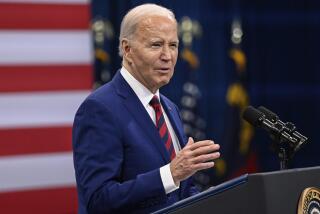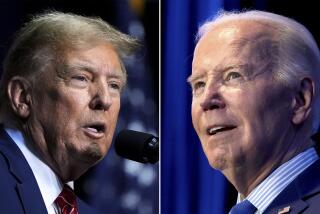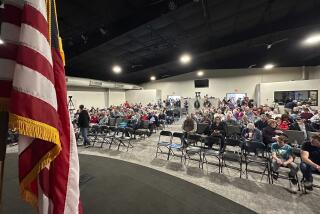Final result gives Mitt Romney an 8-vote win in Iowa caucuses
In the closest finish in the history of the Iowa caucuses, Mitt Romney and Rick Santorum wound up in a virtual dead heat in the first battle for the Republican presidential nomination, with Romney emerging as the apparent winner by a margin of just eight votes.
When results from the last of the state’s 1,774 precincts were tallied Wednesday morning, Romney had 30,015 votes to Santorum’s 30,007.
Combined, the two accounted for half of the more than 120,000 votes cast at the statewide gatherings of party activists. An apparent glitch in reporting of local results held up announcement of the final result.
LIVE COVERAGE: Iowa GOP caucuses
“We don’t know what the final vote tally is going to be, but congratulations to Rick Santorum. This has been a great victory for him and his effort,” Romney said earlier as he addressed supporters in Des Moines.
“Thank you so much, Iowa,” Santorum, a former Pennsylvania senator, told jubilant supporters in a Des Moines suburb.
According to past results provided by the Des Moines Register, the closest previous GOP caucus result came in 1980, when George H.W. Bush edged Ronald Reagan 31.6% to 29.5%.
In 1996, Bob Dole won by 3 percentage points over Pat Buchanan.
Despite the close result, there is no official provision for a recount because no delegates are at stake. The Republican vote was essentially a popularity contest among those who attended, and at some caucus sites there are no paper records of the vote.
And in fact, despite all of the attention to Tuesday’s events, not a single delegate will be awarded based on the result. Iowa Republicans will allocate delegates to the national convention based on later district and statewide events this spring -- and those that are chosen will not be bound to a single candidate.
Iowa did succeed perhaps in narrowing the field. Ron Paul finished third with 21%, followed by Newt Gingrich at 13%, Rick Perry at 10%, and Michele Bachmann at just 5%.
Based on the disappointing result, Perry said he would return to Texas rather than move on to South Carolina so he could “determine whether there is a path forward for myself in this race.”
Despite, or perhaps because of, the wild voter mood swings that produced a revolving cast of front-runners, the caucuses failed to generate the big increase in voter turnout that many Republicans were expecting.
Virtually the same number of Republicans turned out as in 2008. A clear, cold night was no barrier for Iowa residents. GOP leaders had expected that enthusiasm among party activists would mean increased turnout, like the huge vote that Democrats generated in 2008.
But the lack of a compelling social conservative to excite the Christian conservatives who dominate the caucuses, and a late-starting campaign by Romney, who played down his Iowa campaign until the last six weeks, may have been contributing factors.
Whether either of the candidates can claim momentum heading into the next voting event in New Hampshire is unclear. But Romney does begin the seven-day sprint with a decided advantage, both in terms of polling and campaign resources.
Memoli reported from Manchester, N.H., and West from Des Moines.
More to Read
Start your day right
Sign up for Essential California for news, features and recommendations from the L.A. Times and beyond in your inbox six days a week.
You may occasionally receive promotional content from the Los Angeles Times.







